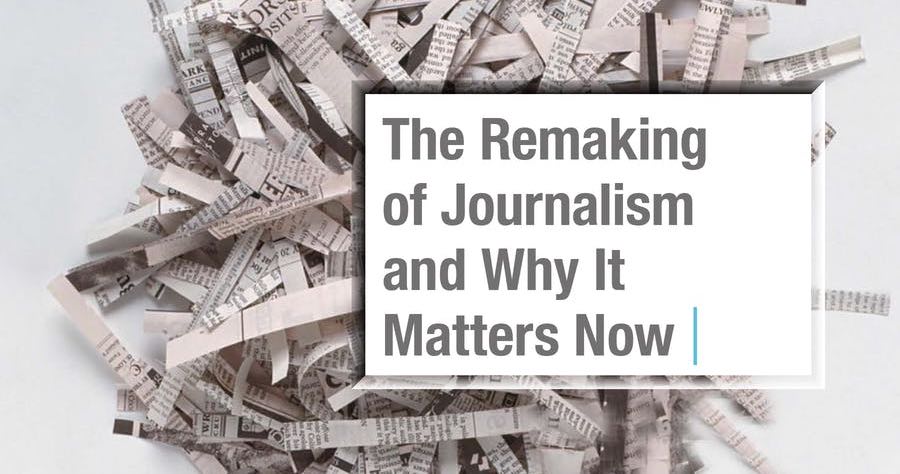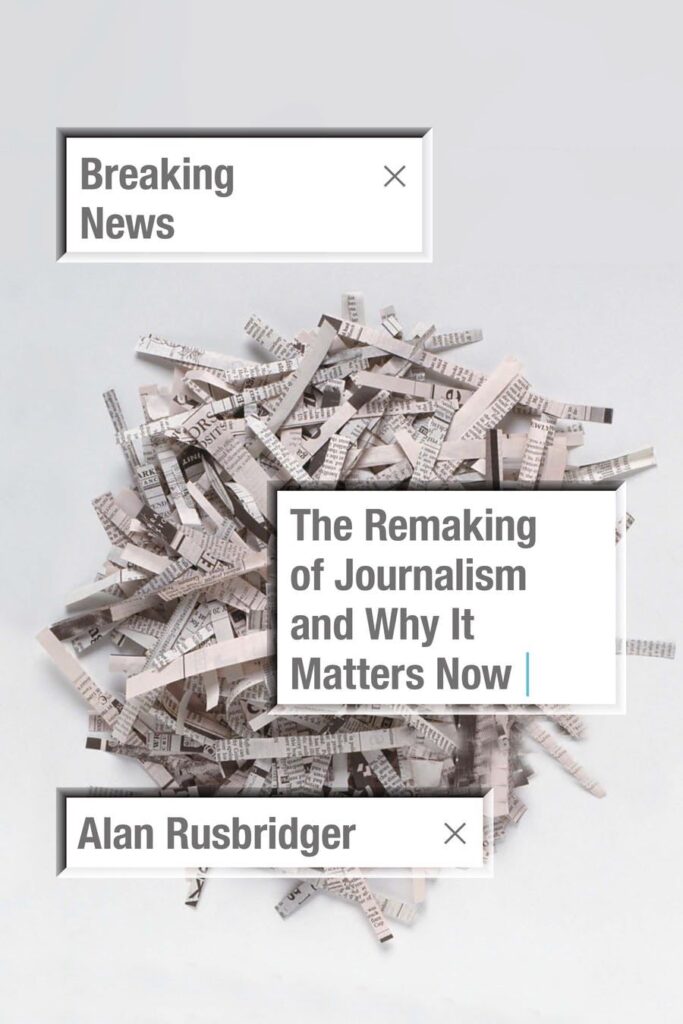
Above: Part of the cover of Alan Rusbridger’s Breaking News.
BitDepth#1330 for November 29, 2021
Alan Rusbridger’s book, Breaking News, pointedly subtitled ‘The Remaking of Journalism and Why It Matters Now’ (Picador, 2018), is a mix of pro-journalism polemic, digital migration history and a tortured grappling with the recent political reportage history of the UK Guardian.
For any journalist trying to make sense of today’s rapid devolution and devaluation of the news product and its new role in civil society, it is required reading.
Rusbridger led the Guardian as its Editor-in-Chief from 1995 to 2015, a span of history that changed the fundamentals of what it meant to be a print newspaper in the world.
Rusbridger oversaw the management of a well-regarded, but relatively small newspaper compared to the titans of Fleet Street.
In 1997, the Guardian’s average circulation was 428,010 (four hundred thousand) compared to The Sun’s 3,877,097 (3.8 million).
By 2020, those figures had dropped to 132,341 for the Guardian and 1,250,634 for The Sun, which was no longer the most widely distributed paper in the UK, surpassed by The Metro, a free paper with a circulation of 1,426,535.
The UK and US Guardian websites now attract more than 100 million visitors per month
The UK and US Guardian websites now attract more than 100 million visitors per month, but circulation was only one of the challenges the paper would face during Rusbridger’s tenure.
The Guardian also had to contend with a growing flood of easily accessed information and disinformation on the internet.
Rusbridger writes of the eventual power of the social internet: “The market in sensationalist, conspiratorial and alarmist junk seemed to thrive in inverse proportion to the fortunes of the old media houses trying to plod the path of traditional reporting.”
“The new automated distribution channels of social media turbo-charged the power of junk.”
But social media wouldn’t begin to be a problem at scale until around 2008, when Facebook began to redefine itself as an information brokerage for its dubious network of ‘friends.’
As early as the 1990’s, the subversion of a centuries-old model of reporting and information curation was already underway.
That challenge would become clearer for Rusbridger as he committed more resources to the paper’s internet presence.

“Journalists no longer have a near-monopoly on news and the means of distribution,” Rusbridger writes.
“The vertical world is gone forever. Journalists no longer stand on a platform above their readers. They need to find a new voice. They have to regain trust.”
“Journalism has to rethink its methods; reconfigure its relationship with the new kaleidoscope of other voices. It has to be more open about what it does and how it does it.”
Rusbridger is frank and analytical about the failures and misjudgements as well as the successes that shaped the powerful presence of Guardian.co.uk today.
It’s now a website that has so far surpassed its print origins and become another journalistic entity entirely, albeit one shaped by the sensibilities of its print-based parent.
It’s not a perfectly inspirational story.
The UK Guardian benefited from its funding by the Scott Trust; a fund created for its continuance in 1936.
There are few newspapers in the world that report to a sympathetic board committed to the continuance of journalistic enterprise, and most must settle for difficult conversations about falling profits with shareholders.
The online publishing landscape is also quite different in 2021.
I remember papering the walls of a tiny office at the TTGuardian in 1999 with tabloid sized prints of the home pages of major online newspapers, trying to figure out how to make the local paper competitive with its fancy first-world brethren.
What required hand-coding and heavy investments in servers then, can now be accomplished for less than a thousand dollars today, if you are willing to invest a few hours of your time for serious YouTube study.
There are few newspapers in the world that report to a sympathetic board committed to the continuance of journalistic enterprise.
Reading the story of the UK Guardian’s two decades worth of digital revelations can make for riveting reading, even if those circumstances are now gone forever and the underlying technology landscape has changed irrevocably.
The larger lessons are worth considering as the backwash of those crushing realities comes ashore in TT and the wider Caribbean region.
Media houses and journalists need to come to grips with the redefining of news as either a public good available to all, or as privileged information, exclusively available to those who pay for it.
That has come to mean a decision about whether to have a paywall or not, but it also echoes deeper into the realities of the execution of the news business.
Journalism that is produced as a public good will need to seek new ways to fund its production while privileged news speaks to smaller audiences willing to finance the cost of production.
In the US, post offices were required by law in 1792 to distribute newspapers for free. Now post offices as a public good are themselves under threat.
The evolution of newsgathering and distribution is no place for sentiment.
Of journalism and journalists, Rusbridger writes: “Whatever it was: a craft, a toolkit, a method, a discipline – was failing in its job sufficiently to understand how newly rearranged societies were now working.”
“New networks were having a literally incalculable effect on how connected citizens thought, behaved, informed themselves and voted.”
Rusbridger argues that the response to fake news should always be…journalism.
But for that answer to have resonance and value, it must be underwritten by trust, which is no longer a given for someone reporting under a byline.
Trust must now be won through conversation, transparency and engagement with an audience that most journalists previously dealt with as paying punters, who hurled letters to the editor from afar into the newsroom.
Today, they are as close as our email in-boxes and Twitter feeds.
Alan Rusbridger stepped down as editor at the UK Guardian in 2015, but internal wrangling led to him not being appointed chairman of the Scott Trust as planned. The paper makes money from a donations model, but revenue continues to be a challenge for the paper.


